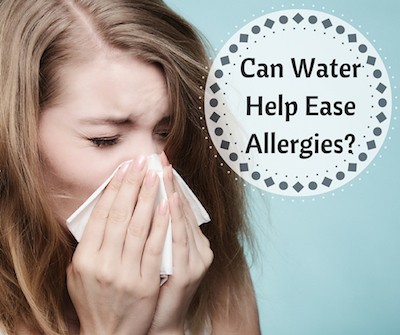
Every year millions of people are effected by the brutal triggers of seasonal allergies. While sneezing, runny nose, itchy and watery eyes are all pretty common indicators allergy discomfort, dehydration may be the most important and often most overlooked symptom. Changing temperatures and drier air are harsh on the body’s ability to stay hydrated. Drinking lots of water not only flushes your system, it supports elimination of foreign substances, including allergens, that circulate in your system.
Drinking ample amounts of water daily is essential to your general health, but keeping your body hydrated could also mean the end of springtime misery. Consumption of extra fluids can help thin the mucus in your nasal passages and encourage sinus drainage. Although tempting alternatives, beverages that are high in sugar and caffeine are also dehydrating culprits. So, the ideal goal is to drink at least 60 ounces of water daily. Resources like home water delivery are an inexpensive way to meet your water intake goals while being sure you are receiving the healthiest, and highest quality water recommended.
Dehydration and allergies
Those with allergies suffer due to a histamine reaction in the body. Your immune system produces histamines to help guard your body against dangerous pollutants. The annoying symptoms caused by your allergies is actually your body fighting off the harmful irritants like, mold, dust and pollen. Histamines also help regulate your body’s water supply. When your body is dehydrated, or not getting adequate water, histamine production acts as a defensive mechanism to preserve the water remaining in the body. Once your body is dehydrated, the histamine production increases, which causes the body to have the same trigger symptoms as seasonal allergies.
Drinking plenty of water will help prevent the higher histamine production and alleviate the allergy symptoms. Studies estimate that over 75% of our population suffers from the effects of dehydration. Dehydration can also affect the hydration of your skin. Dehydration can cause the skin to become dry and rough. Dry skin can cause uncomfortable conditions like severe itching, scaling, and cracking in the face, hands, and feet.
Rehydrate the body
Even if you don’t feel thirsty it’s still very important that you consume the appropriate amount of water. Because your body has been in a hydration preservation mode for so long, rehydrating your body may seem like an obstacle. But stick with it! Think about this, the more you pour water onto dry ground, the more the water starts to be absorbed into land and eventually the soil will soften. The body is similar, as you take in more and more water, the more accustomed your body will become to hydration. Try sticking with the following steps to proper rehydration.
- Drink water instead of other fluids. No matter how enticing other fluids can be, especially that morning cup of coffee, there is no substitution for the hydrating benefits of water.
- Drink water throughout the day. The most important time in the day to consume water is when you wake up in the morning. Drinking your water between meals and sipping water during meals is also ideal for digestion and rehydration.
- Drink enough water daily. Rehydrating a dehydrated body means you need to consume at least half of your body weight in ounces of water daily. Increase this intake as you exercise and also during hotter weather.
- Keep track of how much water you drink. Tracking your water consumption gives you an idea of how much water you are drinking per day and is the only way to know for sure if you are drinking enough water to rehydrate your body.
Remember, water is essential to your health. Staying properly hydrated means your body can react better to the pesky allergens, and not need to produce such high levels of histamines due to lack of water. Water is an inexpensive and effective way to regulate your seasonal allergies. So, drink up.
